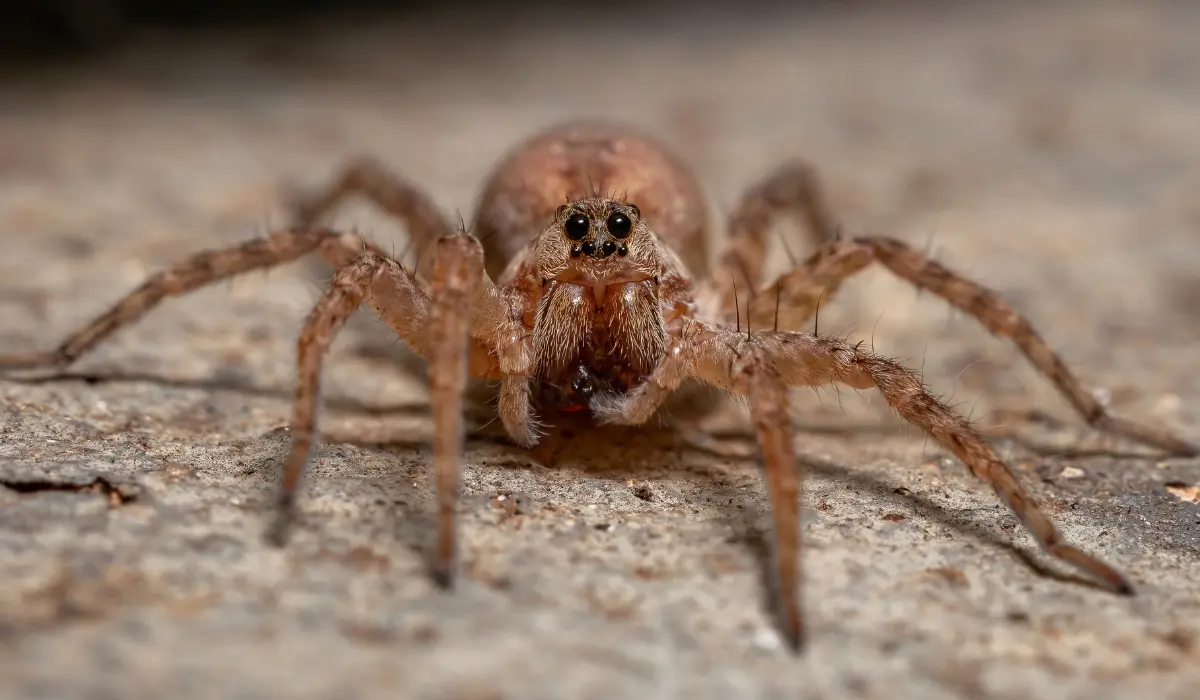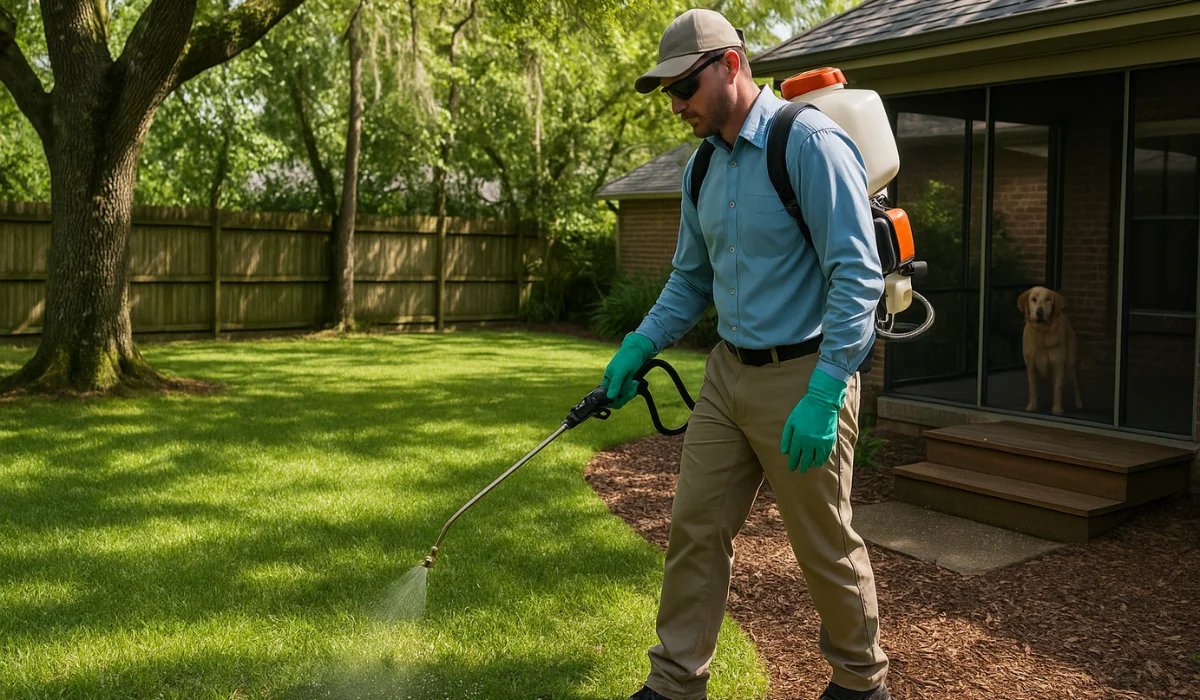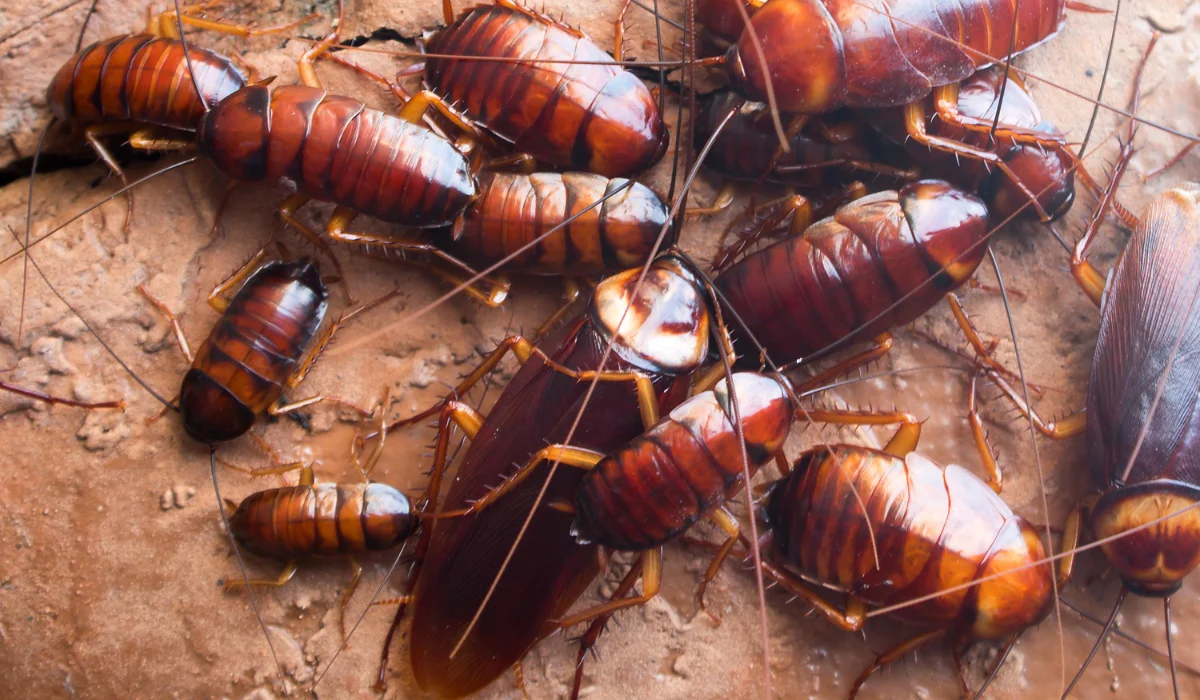Wolf spiders are some of the most misunderstood arachnids in Louisiana. They look intimidating with their large eyes and long legs, and spotting one sprinting across your living room can be startling. But before you go into full panic mode, it’s helpful to know why these fast-moving hunters come indoors in the first place, and what you can do to keep them out.
If you’ve noticed more spiders around your home lately, you’re not alone. Many Louisiana homeowners start seeing wolf spiders in the fall and early winter, when these nocturnal hunters seek shelter, food, and a mate. While they don’t usually mean harm, their sudden appearance indoors can be unnerving, especially if you’re not a fan of eight-legged visitors.
Understanding what brings wolf spiders inside can help you take targeted steps to prevent them from settling in. Whether you live in Baton Rouge, New Orleans, or one of the smaller towns nearby, the conditions that attract these spiders tend to be the same. Let’s break down what they’re looking for and how you can keep them outside where they belong.
Key Takeaways
• Wolf spiders enter homes in search of food, moisture, and shelter, often following other pests like cockroaches, ants, or smaller spiders indoors.
• Dark, cluttered, and moist areas like basements and crawl spaces attract them, especially during cooler months in Louisiana.
• They aren’t dangerous to humans, but their presence may indicate a larger pest problem in the home.
• Preventing wolf spiders starts with sealing entry points, reducing clutter, and controlling other insects they feed on. Professional pest control can help with both spiders and their prey.
Why are there wolf spiders in your house?
Wolf spiders don’t spin webs to catch prey like orb weavers or common house spiders. Instead, they actively hunt down insects, which makes your home a convenient buffet if there are other bugs around.
In Louisiana homes, especially in places like New Orleans, Baton Rouge, and Thibodaux, wolf spiders often sneak in while chasing cockroaches, crickets, or even smaller spiders, such as cellar spiders and jumping spiders.
In most cases, their presence means your home is already attractive to other pests.
What draws wolf spiders indoors?
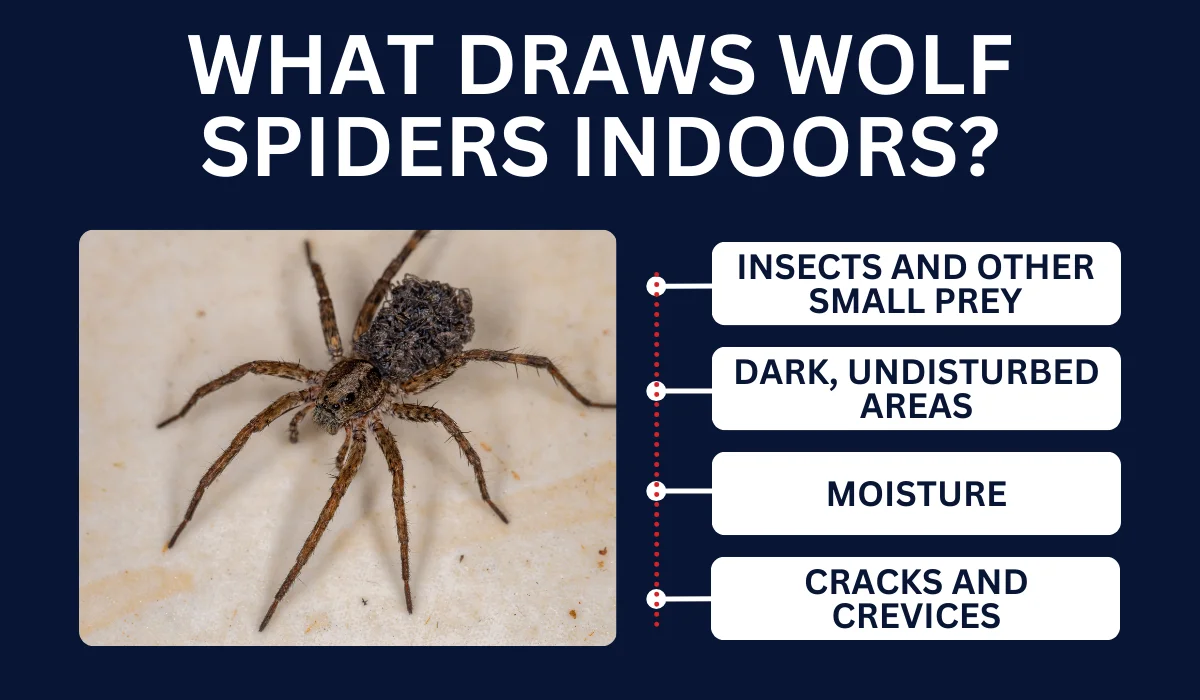
These spiders aren’t entering your home to cause trouble; they’re usually on the move looking for food, shelter, or mates. Here’s what can attract them:
1. Insects and other small prey
Wolf spiders feed on insects and smaller spiders. If your home has cockroaches, ants, or a brown recluse spider problem, chances are you’re also creating a nice hunting ground for wolf spiders.
2. Dark, undisturbed areas
They love places that are quiet and secluded. Basements, garages, crawl spaces, and cluttered storage areas are perfect hiding spots. If you have leaf litter, woodpiles, or heavy vegetation around the foundation of your house, you may also be inviting them in.
3. Moisture
Louisiana’s warm, humid climate allows moisture to accumulate easily inside homes, particularly in bathrooms, laundry rooms, and under sinks. Wolf spiders prefer these damp environments for laying egg sacs and raising spiderlings.
4. Cracks and crevices
Like many pests, wolf spiders enter through small openings, unsealed windows, gaps around doors, or cracks in your foundation. These hidden routes are like an open door to them.
Are wolf spiders dangerous?
While they look scary and can bite if provoked, wolf spiders are not considered dangerous. A wolf spider bite might cause mild swelling or redness, but it’s not venomous like a black widow or brown recluse spider.
Still, that doesn’t mean you want them living rent-free in your home.
How to prevent a wolf spider infestation
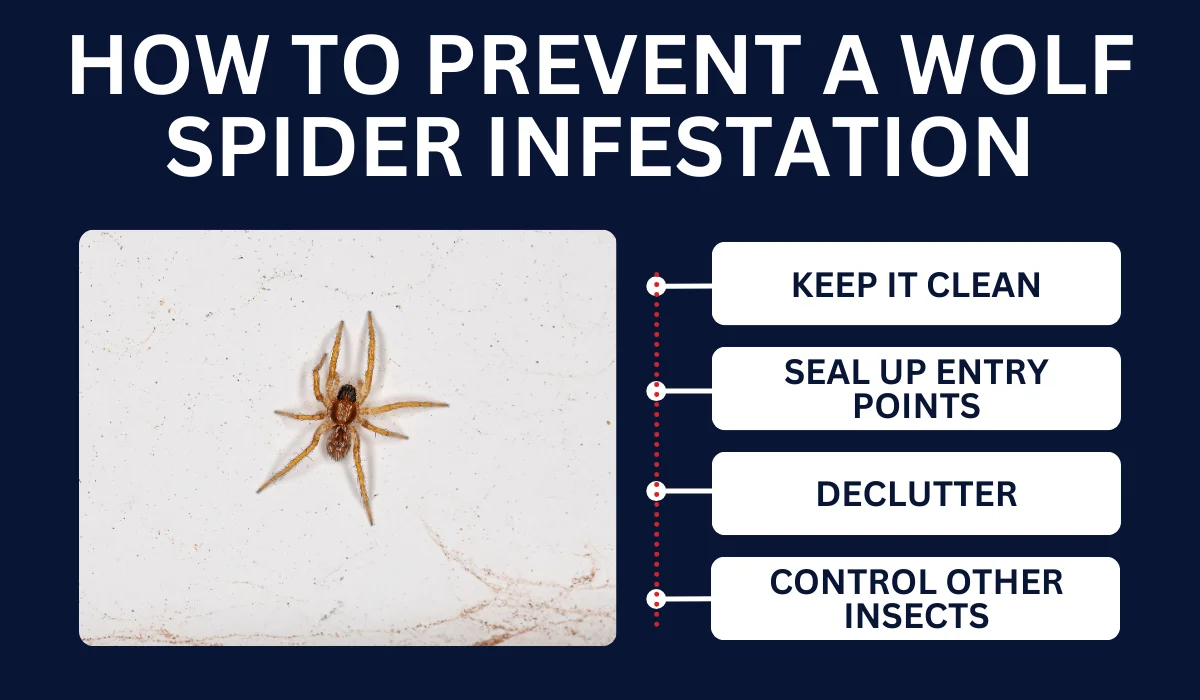
If you’re seeing more than the occasional spider, it’s time to take action. Here’s how to make your home less inviting:
1. Keep it clean
Vacuum regularly, especially around baseboards, corners, and under furniture. This helps remove egg sacs, food crumbs that attract prey insects, and any spiders that may be hiding out.
2. Seal up entry points
Inspect the exterior of your home for gaps and crevices, particularly around windows, doors, vents, and utility pipes. Use caulk or weather stripping to block their path.
3. Declutter
Garages, basements, and attics can become spider havens if they’re full of boxes and unused items. Decluttering gives wolf spiders fewer places to hide.
4. Control other insects
Because wolf spiders prey on other bugs, reducing your overall pest population is one of the most effective ways to discourage them. Professional pest control services can target both the spiders and their food sources.
Are you dealing with female wolf spiders and egg sacs?
Female wolf spiders carry their egg sacs with them and even keep their spiderlings on their backs after they hatch. Spotting one in your home could mean more spiders aren’t far behind.
If you see a large spider with a round sac attached to its spinnerets or one being trailed by a cluster of baby spiderlings, call a local spider control expert before the problem grows.
How LaJaunie’s Pest Control can help
At LaJaunie’s, we provide full-service pest control throughout southeastern Louisiana, from Baton Rouge to Houma to New Orleans. Whether you’re dealing with wolf spiders or another species of spider, our team can identify the issue and offer the proper treatment, starting with a free quote.
Our team is familiar with the specific spider species common to our area, including the Carolina wolf spider, brown widow, black widow, and common house spider.
We don’t just treat the spider, you see, we find where they’re hiding, eliminate their food sources, and prevent them from coming back. That means inspecting basements, garages, leaf piles, and crevices around your home that might be attracting them in the first place.
Final thoughts
Wolf spiders may appear alarming, but their presence is often a sign of other pest problems that require attention. If you’re noticing more spider activity than usual, especially in areas like garages, basements, or cluttered corners, it’s time to take a closer look at what’s attracting them.
Routine pest control doesn’t just address the spiders; it addresses the entire ecosystem they depend on. That’s where we come in.
Whether you’re tired of chasing down wolf spiders with a broom or want to know your home is protected from pests, LaJaunie’s is ready to help. Contact us to schedule an inspection tailored to your specific needs and ensure your peace of mind.
FAQs
What’s the difference between a wolf spider and a brown recluse?
Wolf spiders are typically larger and characterized by their prominent front legs and large eyes. They don’t spin webs and are more likely to be seen running across floors. Brown recluse spiders are smaller, more reclusive, and have a violin-shaped marking on their back.
Are wolf spiders common in Louisiana homes?
Yes, especially in rural or wooded areas and during cooler months when they seek shelter indoors. You’re more likely to spot them in basements, garages, or laundry rooms.
Do wolf spiders spin webs?
No, unlike orb weavers or cobweb spiders, wolf spiders hunt their prey on foot and don’t build webs to catch food.
 By: LaJaunie's Pest Control
By: LaJaunie's Pest Control 